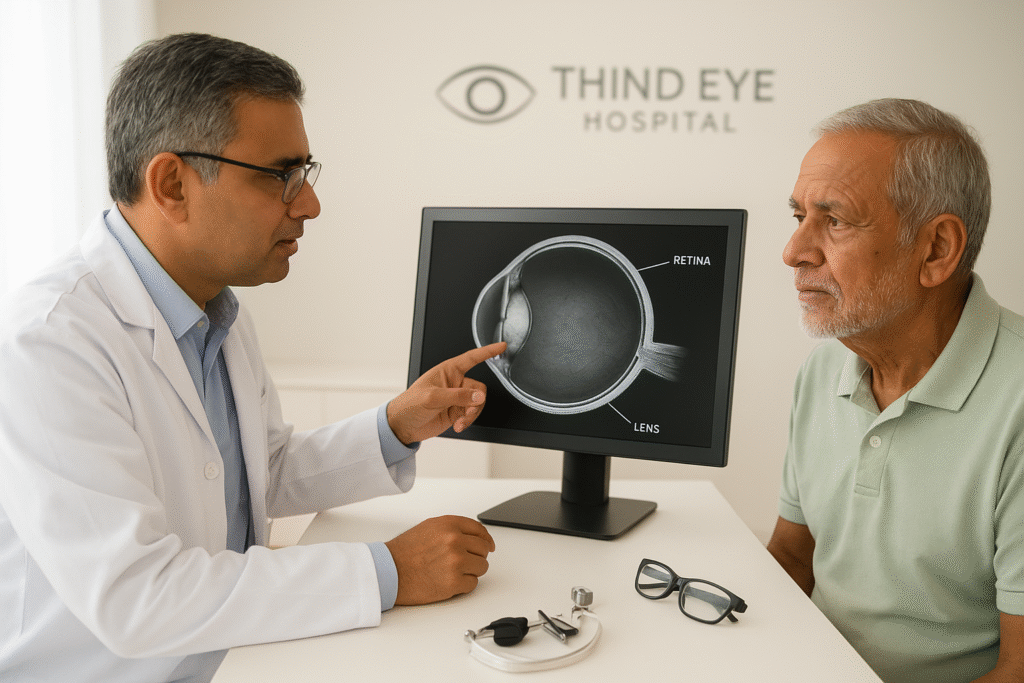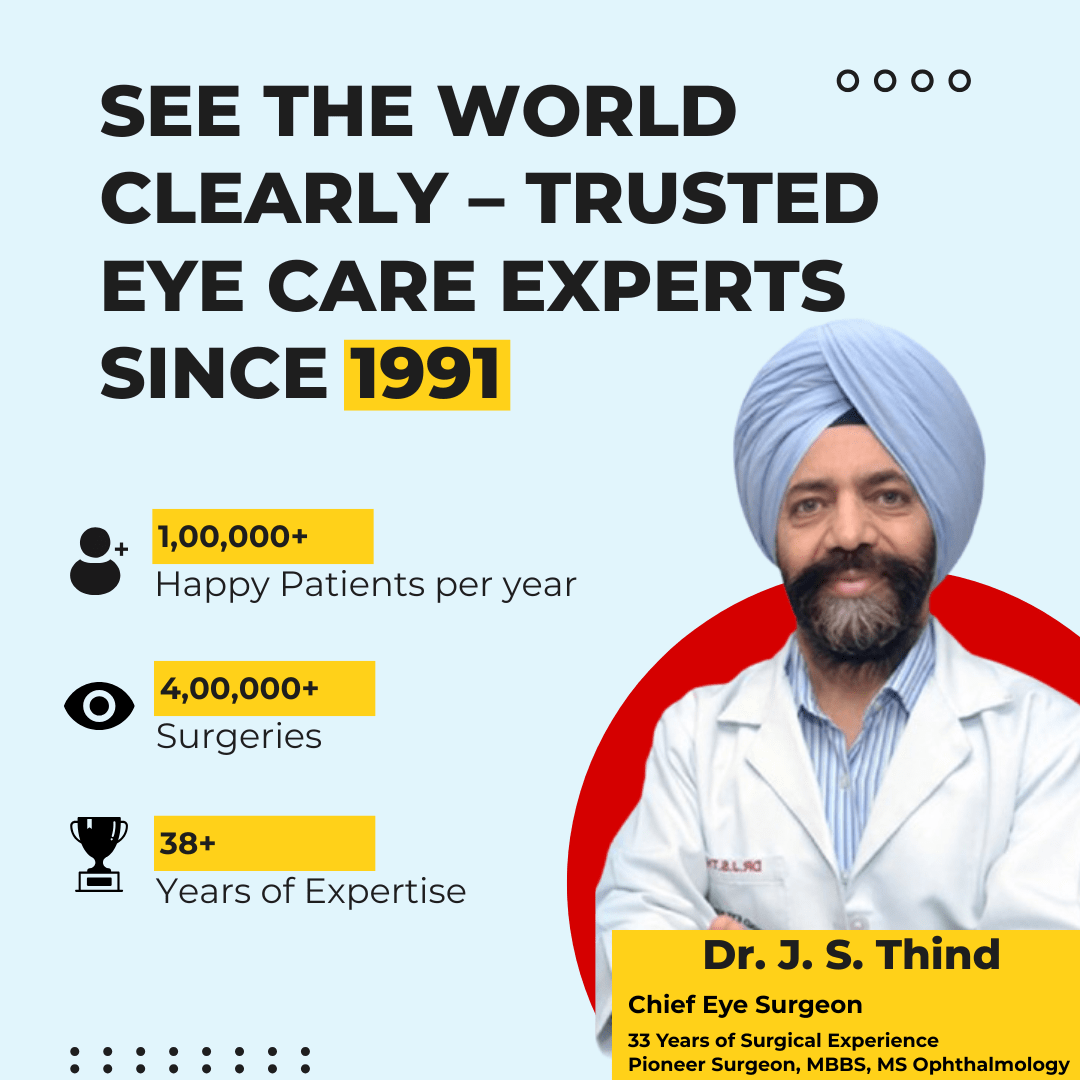Cataracts are one of the leading causes of vision impairment worldwide, especially among seniors. While the condition is common, the good news is that cataracts are also highly treatable if caught in time. Recognizing the early signs of cataracts and seeking timely treatment can prevent permanent damage and help you maintain clear, comfortable vision for years to come.
At Thind Eye Hospital, trusted as the best eye hospital in Jalandhar, our cataract specialists use advanced technology to detect even the earliest stages of cataracts. In this guide, we’ll explain what cataracts are, how to identify the first warning signs, and the treatment options available to restore your sight.

What Are Cataracts and How Do They Affect Vision?
A cataract forms when the natural lens of the eye becomes cloudy, usually due to protein buildup. This clouding prevents light from properly focusing on the retina, causing blurry or hazy vision.
Cataracts often develop gradually, making it easy to ignore the early signs of cataracts until vision is significantly impaired. Though most commonly age-related, cataracts can also result from:
- Eye injuries or trauma
- Radiation exposure
- Long-term use of certain medications
- Chronic conditions like diabetes or hypertension
Without treatment, cataracts progress slowly but steadily, eventually causing severe vision loss or blindness.
Early Signs of Cataracts You Shouldn’t Ignore
The early signs of cataracts may be subtle at first, but spotting them early is key to protecting your vision. Common symptoms include:
- Blurry or cloudy vision – like looking through frosted glass
- Faded or yellowed colors – making the world look duller
- Increased sensitivity to light or glare – headlights or sunlight may feel uncomfortable
- Difficulty seeing at night – especially while driving
- Halos around lights – often noticed at night
- Frequent prescription changes – needing stronger glasses more often than usual
- Double vision in one eye – which doesn’t go away with blinking
If you are over 50 and notice any of these early signs of cataracts, it’s crucial to schedule an eye exam, even if your symptoms feel mild.
How to Delay Cataracts with Lifestyle Choices
While aging is the most common cause, you can take steps to slow cataract progression. Our specialists recommend:
- Protect your eyes from UV rays – Wear certified UV-protection sunglasses every time you’re outdoors.
- Quit smoking – Smoking accelerates oxidative stress, increasing cataract risk.
- Eat an eye-healthy diet – Include foods rich in antioxidants, Vitamin C, Vitamin E, lutein, and omega-3s such as leafy greens, nuts, and fish.
- Manage chronic conditions – Keep diabetes, hypertension, and cholesterol under control.
- Limit alcohol consumption – Excessive alcohol has been linked to faster cataract formation.
- Schedule regular eye exams – Early detection of cataracts ensures timely treatment.
Treatment Options for Cataracts
Cataracts cannot be reversed naturally, but timely treatment restores clear vision. Options depend on the stage of cataract development:
Non-Surgical Relief (for early stages)
- Updated glasses prescription to improve clarity
- Brighter lighting for reading and daily tasks
- Avoid night driving if glare is an issue
These are temporary measures. Once cataracts interfere with your daily life, surgery is the definitive solution.
Advanced Cataract Surgery
At Thind Eye Hospital, cataract surgery is a safe, painless, and highly effective procedure. During surgery:
- The cloudy natural lens is removed
- A clear artificial intraocular lens (IOL) is implanted
- Vision clarity is restored, often with reduced dependency on glasses
We offer premium IOL options, including multifocal and toric lenses, designed to meet each patient’s lifestyle needs.
Benefits of cataract surgery include:
- Sharper, brighter vision
- Better night driving and reduced glare
- Enhanced color perception
- Long-lasting results
Why Choose Thind Eye Hospital for Cataract Care?
At Thind Eye Hospital, we combine decades of expertise with the latest diagnostic and surgical technologies. Here’s what makes us the preferred choice:
- Expert cataract specialists with years of proven experience
- Advanced imaging tools to detect the early signs of cataracts
- Personalized treatment plans based on lifestyle and vision goals
- State-of-the-art surgical suites with femtosecond laser-assisted technology
- Comprehensive pre- and post-op care for a smooth recovery
Take Action: Don’t Ignore the Early Signs of Cataracts
Cataracts don’t develop overnight, but their impact on your quality of life can be profound. By recognizing the early signs of cataracts like blurry vision, glare sensitivity, or halos around lights, you can take timely action to protect and restore your sight.
Schedule your cataract consultation today at Thind Eye Hospital, Jalandhar’s most trusted center for cataract care. Let our expert team help you enjoy clear, sharp vision again.
FAQs
The most common early signs of cataracts include blurry vision, glare sensitivity, faded colors, halos around lights, and frequent changes in your eyeglass prescription.
Cataracts most often begin developing after the age of 50, but they can appear earlier due to diabetes, smoking, or prolonged UV exposure.
In the initial stages, stronger glasses, brighter lighting, and lifestyle changes can help. However, surgery is the only permanent treatment once cataracts affect daily life.
Ophthalmologists use slit-lamp exams, retinal imaging, and vision tests to detect the early signs of cataracts even before symptoms worsen.
Thind Eye Hospital offers advanced cataract diagnostics, prevention strategies, and painless cataract surgery led by experienced eye specialists.


